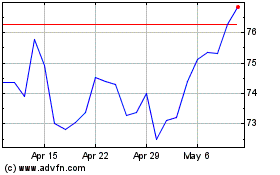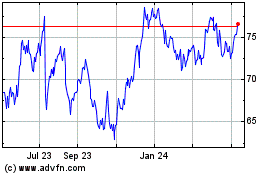Regulators Set to Find Flaws in Big U.S. Banks' 'Living Wills' -- Update
April 12 2016 - 4:57PM
Dow Jones News
By Ryan Tracy
WASHINGTON -- U.S. regulators are preparing to notify some of
the largest U.S. banks, including J.P. Morgan Chase & Co., that
they have submitted flawed plans detailing how they would handle a
potential bankruptcy, according to people familiar with the
matter.
The move, which could come as soon as this week, would raise the
prospect of higher capital requirements or other regulatory
sanctions for some of the institutions, and call into question
whether the firms remain "too big to fail" without a taxpayer
bailout.
At least half of the eight American banks labeled "systemically
important" by global regulators are expected to receive a harsh
verdict on their "living wills" that they were required to submit
under rules crafted since the financial crisis aimed at preventing
another bank bailout, these people said.
The long-awaited verdict by the Federal Reserve and Federal
Deposit Insurance Corp. is not yet final and could change, but
regulators are putting the finishing touches on their feedback to
the firms and will make their findings public soon, these people
said.
The Fed's governing board was set to hold a closed meeting
Tuesday afternoon to discuss the matter, one of the people
said.
Representatives for the Fed, FDIC and J.P. Morgan declined to
comment.
J.P. Morgan has previously said its living will is credible and
that it has a "fortress balance sheet" that would prevent it from
ever needing to tap taxpayers for help in a crisis. "We will be
vigilant and will never take such a high degree of risk that it
jeopardizes the health of our company....this is a bedrock
principle," Chief Executive James Dimon said in his recent
shareholder letter.
The adverse findings would mean J.P. Morgan and other firms will
have to rewrite their bankruptcy strategies to address issues
regulators have identified, or face sanctions, such as being
required to hold higher levels of capital, which restricts
borrowing and protects against losses -- but can also eat into
profitability. If they fail to submit credible strategies
repeatedly over a period of years, regulators could force them to
divest certain assets.
In addition to J.P. Morgan, regulators have significant concerns
about the bankruptcy strategies of the two so-called trust banks in
the group: Bank of New York Mellon Corp. and State Street Corp.,
according to people familiar with the matter. Regulators have also
been considering whether Bank of America Corp. should receive an
adverse verdict, these people said.
Representatives for Bank of New York, State Street and Bank of
America had no immediate comment.
Citigroup Inc. was expected to receive a positive finding from
regulators, these people said.
A Citigroup spokesman had no comment.
Details about the other three American banks covered by the
process -- Goldman Sachs Group Inc., Morgan Stanley and Wells Fargo
& Co. -- couldn't be confirmed.
The expected verdicts do not mean the regulators believe the
banks face any imminent danger of going out of business. Rather,
the whole exercise was designed to start with the premise that each
might one day face such extreme distress and show how they would
respond. The bankruptcy strategies also don't take into account the
fact that regulators could use other methods to avoid bailouts,
including using the FDIC's authority to take over and liquidate a
failing firm.
Regardless of what regulators say when they release their
findings, however, the decisions are likely to feed big-bank
critics across the political spectrum who say the government needs
to take drastic action to reduce the size and influence of large
Wall Street banks.
Write to Ryan Tracy at ryan.tracy@wsj.com
(END) Dow Jones Newswires
April 12, 2016 16:42 ET (20:42 GMT)
Copyright (c) 2016 Dow Jones & Company, Inc.
State Street (NYSE:STT)
Historical Stock Chart
From Jun 2024 to Jul 2024

State Street (NYSE:STT)
Historical Stock Chart
From Jul 2023 to Jul 2024
